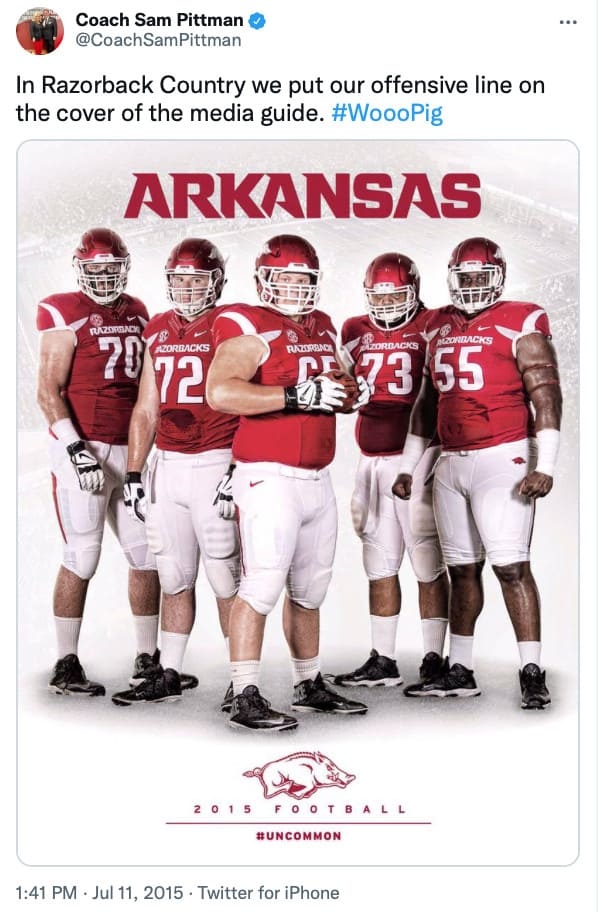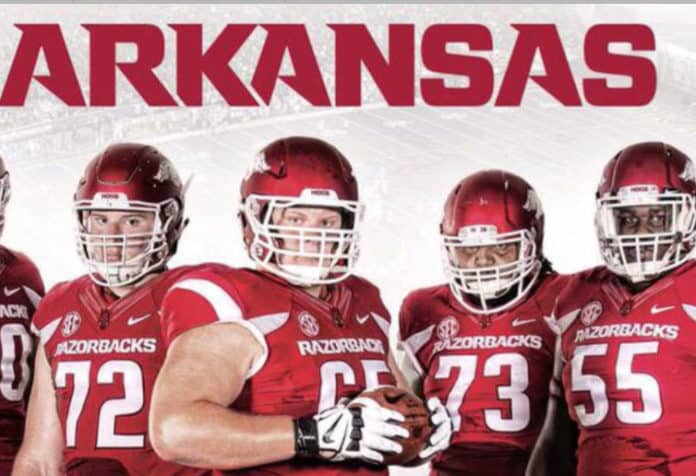Welcome to America, where there is no one way to do anything. Everyone is free to tackle whatever task they wish in whatever form they wish. But with that freedom of choice comes another all-American value: criticism.
Football, the most American of sports (sorry, baseball, for as much as I prefer you, nobody in the world enjoys the gridiron more than the Stars and Stripes), is a microcosm of America. Its fans are passionate. Its coaches and players, dedicated and brilliant. And it’s a game that, like the country in which it’s founded, is ever-changing. What used to work might not anymore. Someone, somewhere is developing a new approach, a new way of thinking that’s going to soon become the norm.
Too high and mighty for ya? It shouldn’t be. Football is a game in which your team (your viewpoint) is the one who should be more respected. They do it the right way. It’s those other teams (opposing viewpoints) that are doing it the wrong way and are dangerous for the game.
Ahem.
Arkansas football fits into this forced metaphor quite well. It wasn’t but five years ago when the thinking in and around Fayetteville was that a fast, quick football team was the way to the top of the SEC. Spread ‘em out, sling it around. Such an approach was a disaster and left Chad Morris as the most despised coach – and worst coach, record-wise – in school history. When athletic director Hunter Yurachek made his next hire, he not only hired a completely different kind of person, but a coach with a completely different idea of how things should be done, too.
Let’s back up even more, this time to 2015, a year after the Razorbacks had officially turned the corner from the Bobby Petrino debacle: Arkansas and head coach Bret Bielema decided they were going to make a statement in the offseason. Bielema, never one to shy away from comment or stir conversation, was more than happy to talk about his program’s decision to put the offensive line on the media guide. The coach had built his career to that point behind the big fellas up front. And in Fayetteville, he had arguably the best offensive line coach in the country, Sam Pittman, to run the unit.

When Arkansas Football Paced all College and NFL Teams
Those were some big ol’ boys. Denver Kirkland played at 345 pounds. Dan Skipper was at 320. Mitch Smothers 322. Frank Ragnow was 317. Sebastian Tretola 332. They were not only the biggest starting line in college football, but also topped all NFL teams in terms of average sheer weight. With an average of 328 pounds, that Razorback offensive line was larger than the San Diego Chargers (avg. 326 pounds), Bills (322 pounds) and SEC second-place Florida Gators (320 pounds).
It’s no surprise, then, that Pittman is working the same kind of jumbo-sized magic now. Heading into his third season as head Arkansas football coach and with a few years of development under his belt, Pittman has brought that same approach back into the fold.
247Sports’ Danny West, as he does every year, took a look at the spring roster for the Razorbacks and noted any significant weight changes. Only one player among the expected two-deep on the offensive line lost weight from their official playing weight from last season, per West’s glance.
Potential All-American Ricky Stromberg at center is up to 318 pounds. Guards Beaux Limmer and Brady Latham are 300 and 303. Luke Jones, who could play any of the four non-center spots, is 327. Dalton Wagner is up to 337. Ty’Kieast Crawford actually dropped weight: a whole three pounds down 347. And Jalen St. John went up to 334. They’re the Razorbacks most expected to get the longest looks this spring. Four of them were starters last year.
The bigger-is-better approach worked for the Razorbacks the last time Pittman was on campus. Those Hogs up front helped Arkansas to the No. 34 rushing attack in FBS and finished 10th in FBS for fewest sacks allowed. It worked last year, too, even before the weight gain of the returners. Arkansas was first in the SEC and seventh in the country in yards rushing per game, averaging 228 yards on the ground per game. And that was without a truly elite running back as four different backs ran for more than 200 yards on the season and three of them went for more than 500 yards.
It’s unclear whether other schools in the SEC have updated their rosters to reflect new playing weights, but based off current calculations, Arkansas has six players at more than 325 pounds, which is one more than Alabama. The Hogs have four players at 335-plus compared to Georgia’s one. Texas A&M and Florida also cannot meet Arkansas’ girth. Even with the loss of transfer Trelon Smith, it’s clear the Hogs will be going back to the ground game quite a bit come fall.
There is some risk in growing larger, however. Usually, not all that heft is muscle. And heavier objects tend to move more slowly. Not always, certainly, and having a 6-foot-3, 245-pound quarterback with wheels can help alleviate pressure any time a teammate misses a block, making the risk worth taking.
Razorback Defensive Line Slims Down
The approach also contrasts with what Arkansas is doing on the other side of the ball. The interior defensive lineman added weight, but the defensive ends lost it. Theoretically it’s to get speed on the outside to beat hefty opposing tackles. Zach Williams, for example, a player largely expected to be one of the Hogs’ best pass rushers, actually lost 10 pounds and is down to 245 (by the way, Eric Gregory, a ‘tweener who played both end and tackle last year, seems more likely to be on the inside as he’s up above 300 pounds now). The average weight of the unit is 275 pounds, a far cry from the more-than-300 on the offensive side.
The question is whether it’s the right call. In a world where every single decision is judged and criticized, it remains to be seen. But the reality is, Pittman has earned the trust during his time with the Razorbacks over both stints and things appear to be – ahem – on the rise.
***
The below are excerpts from Sam Pittman’s recent interview with Saturday Down South’s Connor O’Gara:
Sam Pittman on Jadon Haselwood’s Expected Impact
“We obviously signed him because we knew we had to replace Treylon [Burks] so he was the one that we were going after to try to replace those numbers in that position. We’ve known him for a long time, recruited him when he was over at Georgia and Jimmy Smith was his high school coach.
But the thing I like about him is how much he’s matured out of high school, not that he was immature. He’s a grown man and physically, mentally he can handle what we’re going to ask him to do, he can handle the pressure of what we’re going to ask him to do.
I think we’re really fortunate to have Haselwood on our team because of the loss of Burks and we’re going to have to replace some numbers, we’re going to have to play some touchdowns, some key catches and we believe that he can be that guy to help us.
What He told Kirby Smart after Georgia Won It All
I just sent him a text that said, “Badass,” on it. I mean, listen I didn’t have anything to do with them guys winning the National Championship but I knew players on the team. And so I don’t even think the Alabama people could be mad at me for rooting for Georgia, I put four years of Jamie and I’s life into the University of Georgia.
But Kirby, we lost it in ’17, I think it was, and in ’17 we lost and they had lost in the SEC Championship game. Sometimes it seems like that’s how it goes, you don’t get to the SEC Championship game or you lose and you’ve still got a chance to win the NATTY, that’s a heck of a league right there, buddy.
And so anyway, I was proud for him, proud for the players that I had coached or recruited or whatever. When I say that, I’m not taking any credit for the game, I didn’t coach them but I knew them and I was proud of that and proud for the coaches.
More on Arkansas football here:



